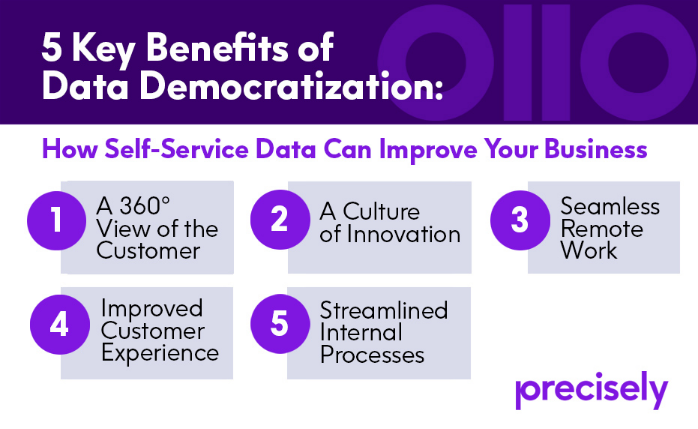Key Takeaways:
- Data democratization is a process that gives virtually anyone in your organization the ability to understand data for better decision-making.
- Data democratization has immense benefits, like a 360° customer view, enhanced innovation, and streamlined internal processes.
- To fully take advantage of these benefits, you also need to keep compliance, security, and potential data misuse in mind.

As companies increasingly recognize the value of their data, many struggle with data democratization and the question of how to unlock that value for stakeholders throughout their organization.
There’s a delicate balance between sharing information broadly within your company and safeguarding confidential information in compliance with the law.
Governments have responded to privacy concerns by enacting an array of new regulations aimed at protecting the privacy of their citizens’ information – like GDPR (Europe’s General Data Protection Regulation), CCPA (the California Consumer Privacy Act), and Australia’s DPP (Data Privacy Protection).
Complying with these regulations while optimizing the value of your data is challenging, but data democratization has immense benefits if your organization is willing to take it on.
Read our eBook
Managing Risk & Compliance in the Age of Data Democratization
This eBook describes a new approach to achieving data accessibility within an organization, while ensuring that proper governance is in place.
What is Data Democratization?
Simply put, data democratization is a process that gives virtually anyone within your organization the ability to understand data to inform better decisions. Regardless of their role, they have insight into what data exists and tools needed to use it effectively.
Sounds great on the surface, right? But as your organization starts the data democratization journey, there are important considerations to keep in mind.
Balancing access with security
Do you really want everyone in your organization to have access to a list of the prospects in your sales pipeline or customer lists – complete with names, addresses, and purchase history?
Clearly, sensitive information needs to be safeguarded for internal business reasons. An effective data democratization initiative must account for the need to secure your company’s valuable, confidential information within your organization’s guidelines.
Navigating privacy regulations
Another concern is compliance with privacy regulations including GDPR, CCPA, and DPP. These laws are continuously evolving with technological advancements and new court rulings further shape their implementation.
Mitigating the risk of data misuse
Finally, there’s the risk of unintended misuse of data. An uninformed user, armed with a body of data that they don’t fully understand, could reach incorrect conclusions that lead to poor business results.
Someone like a trained data scientist, for example, will be fully aware of the potential pitfalls of poor data quality and can take the necessary steps to mitigate that risk. But a novice using the same information may not fully understand the risks in the first place. That’s why you need an effective data quality program in place before taking on data democratization.
When your organization understands and addresses these risks effectively, the benefits of data democracy are clear. Let’s look at a few examples.
Benefit 1: A 360° View of the Customer
Customer expectations have never been higher – and they continue to grow. They desire a consistent, unified experience whenever they interact with your organization.
For years, marketing departments have struggled to reach the right customers at the right time, with the right message. In today’s data-driven world, organizations are in a better position than ever to meet this challenge head-on.
Successfully integrating, harmonizing, and enriching your existing customer data wherever it resides helps you develop a powerful 360° view of every customer. Imagine making that view available to everyone in your organization who could benefit from it:
- Marketing can create more effective messaging to existing customers, and spend their budget more efficiently.
- Product management gains powerful insights into your current and potential future audience – and, a view into potential new products and services to increase your company’s share of wallet.
- Top management gets a clearer view of where your company is succeeding, and where it’s falling short.
An effective data democratization initiative opens the door for virtually anyone in your organization to use that 360° view of the customer to create business value in new and often unexpected ways.
Benefit 2: A Culture of Innovation
Innovation often starts at the ground level. Someone working on the front lines has an idea, explores a possibility, and shares it within a team. Discussion and experimentation often follow, leading to further exploration – and eventually, a breakthrough.
But when information is controlled by a gatekeeper, it creates barriers to this kind of innovative thinking. In many organizations, stakeholders aren’t even aware of the data available to them.
A company that embraces data democratization, on the other hand, begins with the presumption that innovation will happen, provided that the right tools are in place, including effective data quality and data governance programs.
Benefit 3. Seamless Remote Work
Data democratization is all about self-service, enabling tasks to be completed much faster. In a traditional office environment, you might expedite inter-departmental requests by walking down the hall to have a face-to-face talk with your colleague from IT. In a virtual office environment, that doesn’t quite work – especially when many are working extended hours or flex time.
Imagine, for example, that you’re planning a new marketing campaign targeting existing customers. You suspect that many of them may be ready to upgrade to a newer edition. To confirm this, you need to pull a list of customers who purchased an older version of your flagship product so you can analyze your target audience further.
Before launching your campaign, you want to answer questions like:
- how many customers fit into this category?
- where do they live?
- what are their demographic profiles?
In many organizations, this means creating a new IT ticket, explaining what you need, and waiting in line with everyone else for your answers.
But with an effective data democratization program, you can discover, request access, and analyze what information is available yourself. This self-service approach is a game changer for remote workers.
Benefit 4. Improved Customer Experience
Data democratization isn’t just about empowering your employees. Sometimes it’s about empowering customers.
Consider what happens when you use an app on your mobile phone to call for a ride-sharing service. Within moments, you’ll see how close the nearest drivers are, and once you select a ride, you have a clear idea of when it will arrive.
This might not seem like data analytics, but the principle is the same: information is powerful. By providing their customers with a constant stream of updated information, ride-sharing companies improve the overall experience.
Utility companies and telecoms, likewise, are democratizing service data for their customers. Consumers can download and analyze their electrical power usage to better understand how to reduce consumption. Telecom companies provide downloadable call records and data usage history.
Governments are making data available to their citizens as well. During the COVID crisis, for example, citizens were eager to get updated stats on case counts, hospitalizations, and more.
The bottom line: people like to stay informed. Make data available to your consumers to deliver a better overall customer experience.

Benefit 5. Streamlined Internal Processes
Data democratization fosters a broader understanding of your company’s information assets. Imagine that the shipping department suffers an unacceptably high number of late deliveries due to bad address information. Meanwhile, the sales tax compliance team has implemented a robust geocoding and address verification system to ensure full compliance with local and state tax laws. If the shipping department is unaware of the tax team’s capabilities, they can’t use that information to solve their problem.
When a company effectively catalogs its data assets as part of a broader data governance initiative, users can determine if the organization already has access to the information needed to resolve its shipping issues. An effective data integrity program will address this problem and improve the company’s internal processes to achieve lower costs and a better customer experience.
Transform Your Data into a Strategic Asset
Ultimately, data democratization requires a solid foundation of data quality and effective data governance. That’s critical to ensure protection of confidential information and full compliance with privacy regulations such as GDPR, CCPA, and DPP.
It’s time to maximize the value of your data and make information a strategic and tactical asset. We offer products and services to enhance data quality, deliver seamless integration, add location context, and boost customer engagement.
Take the next step and read our eBook: Managing Risk & Compliance in the Age of Data Democratization. You’ll discover a new approach to data accessibility within your organization, while ensuring proper governance is in place.







